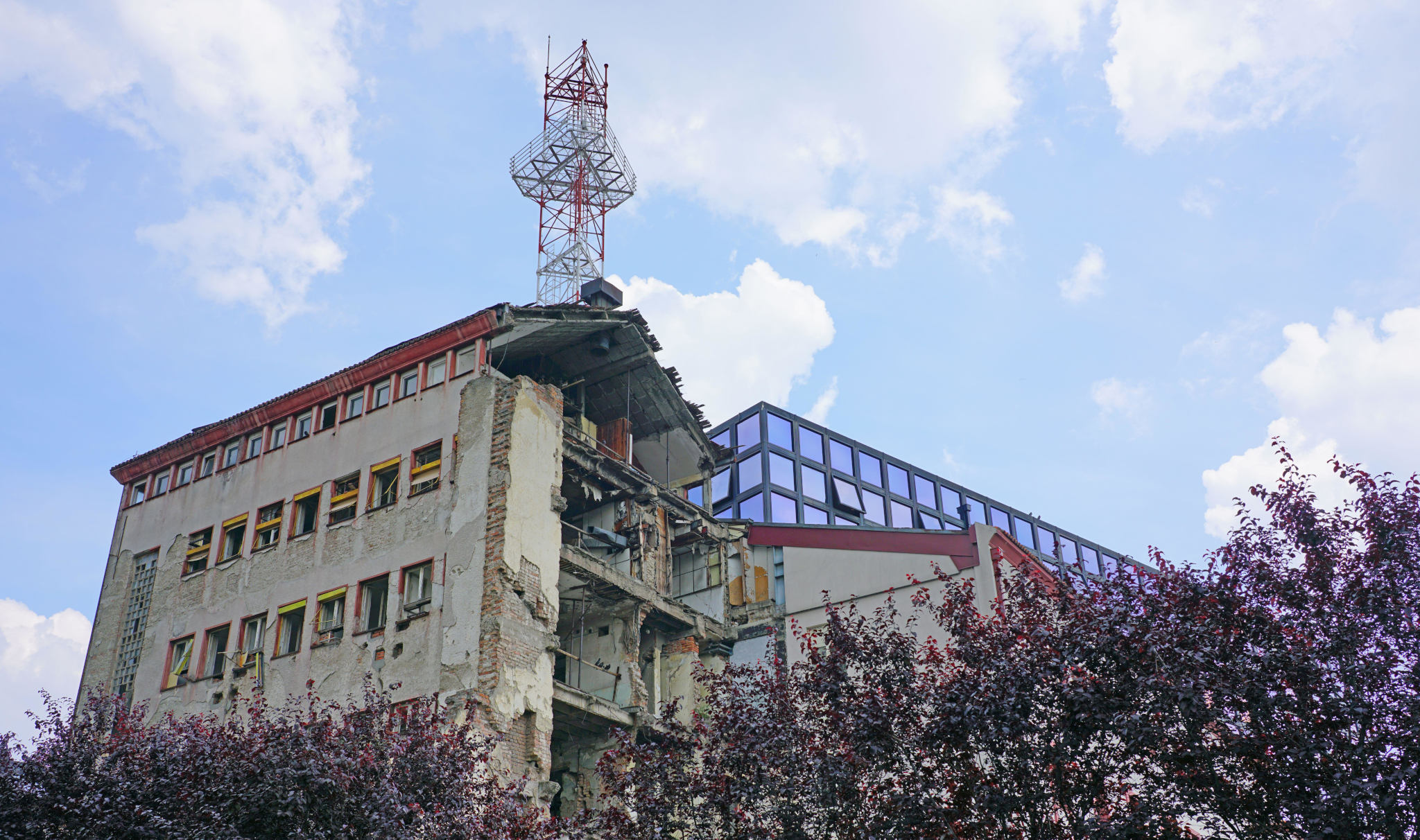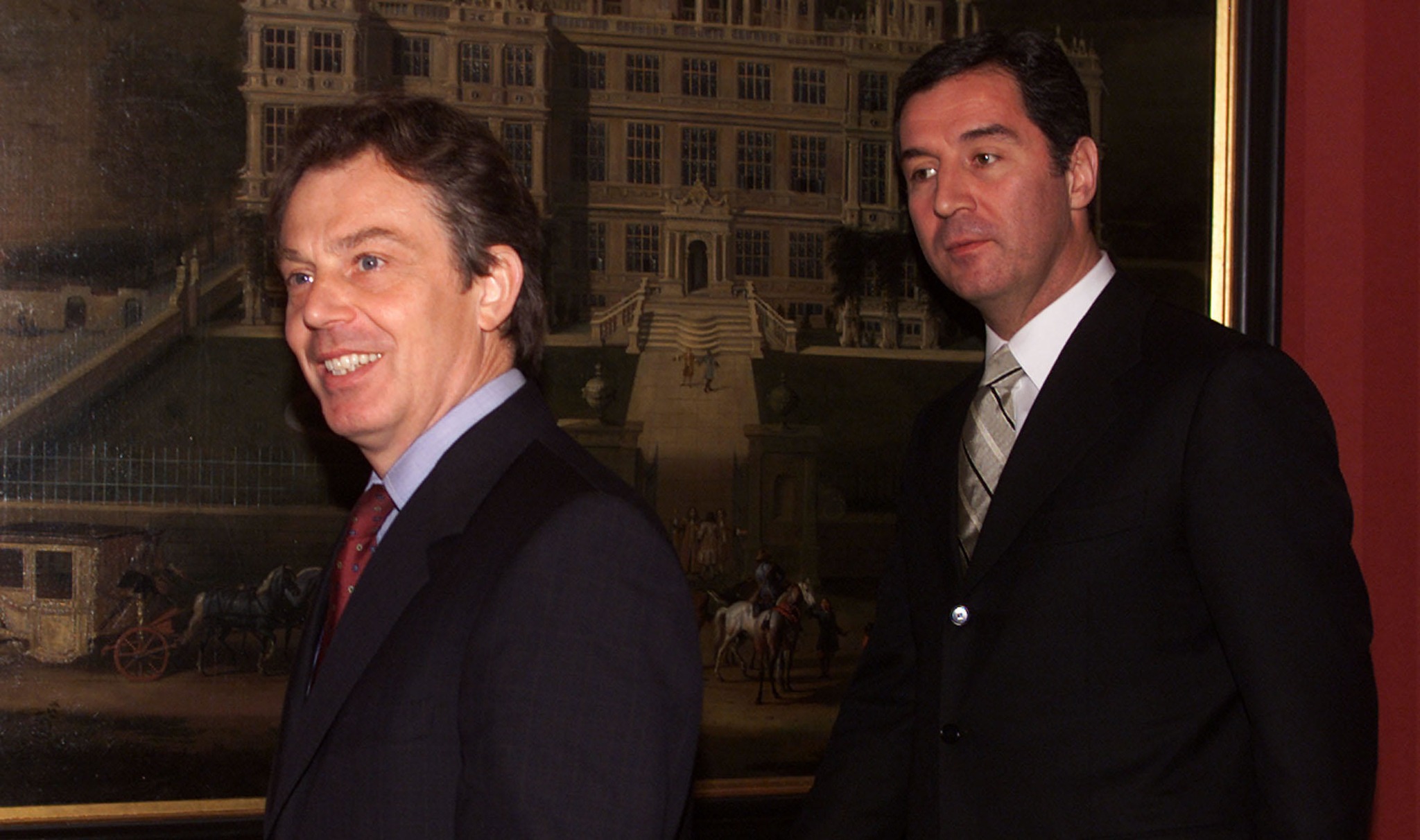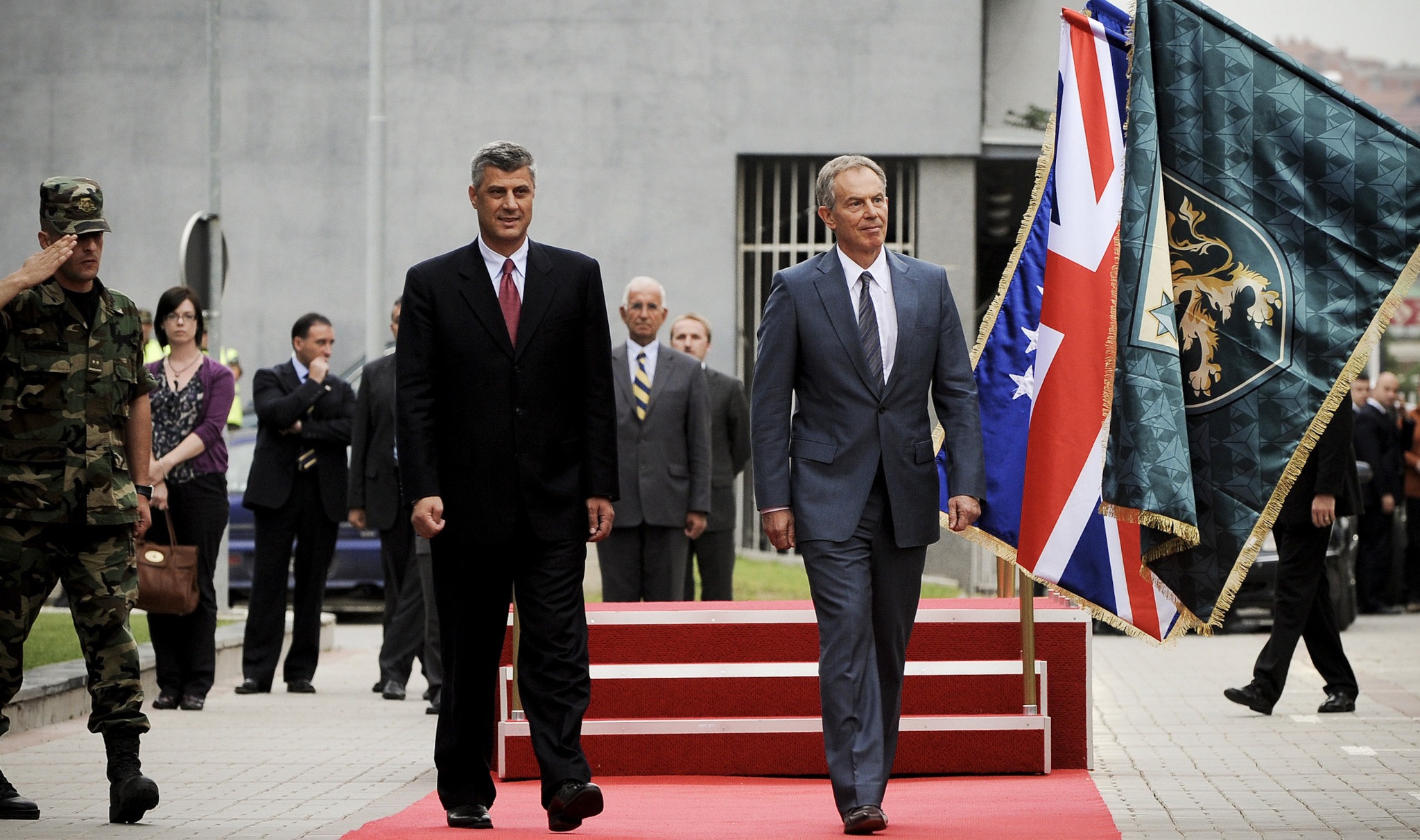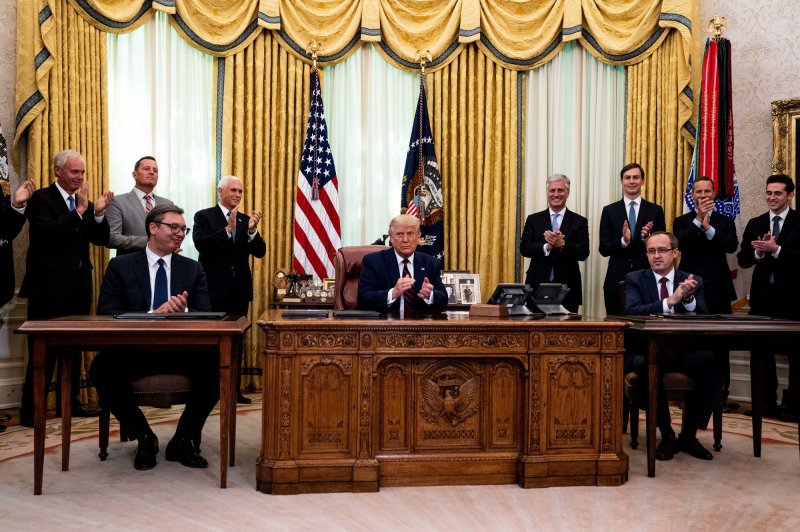End of an era?
Hague trials rock Kosovo's rebel-led politics
Issued on: 12/12/2020 -

Issued on: 12/12/2020 -

Former President Hashim Thaci (C) and other rebel chiefs were once feted for liberating Kosovo from Serbia in a 1990s war STRINGER AFP
Pristina (AFP)
After more than a decade at the helm, Kosovo's former guerillas may have finally met their match -- not at home but in The Hague, where they are on trial for war crimes.
It has been a long and hard fall from grace for former president Hashim Thaci and other ex-rebels who were once feted as heroes for liberating Kosovo from Serbia in a late 1990s war, with the help of NATO.
Yet if they were once associated with the joy of that victory, in recent years they have become the face of a political elite accused of corruption and clientelism that has clouded Kosovo's first decade of independence.
"They became so strong and accumulated so much wealth that it was impossible to overthrow them," said Ismet Sojeva, 66, a retired English teacher.
"Only The Hague could help bring them from the sky back down to earth".
Thaci, 52, and four others were summoned last month to the EU-backed court in the Netherlands on charges of murder, torture, persecution and other war crimes allegedly committed during the 1998-99 conflict with Serbia.
For many Kosovars, it's a complicated moment.
Most strongly defend the uprising that paved Kosovo's path to independence in 2008.
Yet the guerilla leaders themselves have long ago lost their shine among a public frustrated with enduring poverty and dysfunction.
"There is nothing they have not done to us people," said the owner of a tea shop in Pristina who declined to give his name.
"They almost destroyed the state."
- An opportunity -
With trials that could last up to eight years, political science professor Belul Beqaj believes the absence of Thaci and his cadres could open a new chapter for Kosovo politics.
Thaci's PDK party came to power in 2007 and stayed there until losing an election late last year.
"It is the beginning of the end of the era of the powerful military-political group that brought Kosovo to this state," Beqaj said.
There is a rare opportunity for a "new generation of politicians" to fill the void, adds Arben Hajrullahu, a professor of political sciences at the University of Pristina.
Yet the ex-rebels won't "leave soon and easily," he noted, with some key figures still in politics and many others holding sway in powerful state institutions.
The fragmented opposition would need to unite around a common cause, said the professor, a goal that has so far proved difficult in Kosovo's tumultuous political scene.
- War heroes -
Known as the Kosovo Liberation Army (KLA), the ethnic Albanian rebels are deeply embedded in the national narrative, with scores of streets and monuments bearing their names and stories.
They first emerged as a separatist movement in the 1990s in response to growing oppression of the ethnic Albanian population in Kosovo, then a Serbian province.
Thaci, a founding member, served as the group's political head, using a satellite phone to communicate with peace-brokering diplomats and foreign reporters.
Other prominent leaders on trial include the KLA's former spy chief Kadri Veseli, spokesman Jakup Krasniqi and chief of operations Rexhep Selimi.
After the KLA's clashes with Serbian troops intensified in 1998, the rag-tag army swelled from a few hundred members to thousands of recruits.
Victory arrived with NATO's intervention the following year, after 13,000 lives had been lost, mostly Kosovo Albanians.
The KLA was officially disbanded but its members continued to hold sway, consolidating their power through a series of attacks on political rivals.
- 'Corrupt payouts' -
Many top commanders like Thaci swapped their fatigues for politics and have circled the halls of power ever since.
Their levers of control were unveiled in 2011, when wiretapped phone conversations between then-PM Thaci and his associates showed a system of settling political appointments based on cronyism.
Thaci's clan is also accused of using their clout to scupper local investigations of KLA war crimes -- as well as attempts to obstruct the work of the tribunal in The Hague, which was set up in 2015.
"The suspects wield enormous influence over former KLA members and Kosovo in general," Hague prosecutors said in their request for arrest warrants this year.
Officials loyal to Thaci have "presided over corrupt government pay-outs" and job offers to silence potential witnesses, they alleged.
The trials may signal the end of crucial support from the West, which has long propped up Thaci and his allies.
The US has been a particularly robust ally, embracing Thaci at every turn, including when then-Vice President Joe Biden welcomed him to the White House as the "George Washington of Kosovo".
Critics say the West has backed the former rebels to prioritise stability in the region -- at the cost of rotting democratic institutions and a loss of public faith in politics.
Thaci and his men "looked only after settling and feeding themselves," said 22-year-old economy student Albulen Obrazhda, summing up the widespread disillusionment among youth, many of whom are eager to go abroad for better opportunities.
"They left us at the bottom."
© 2020 AFP
Pristina (AFP)
After more than a decade at the helm, Kosovo's former guerillas may have finally met their match -- not at home but in The Hague, where they are on trial for war crimes.
It has been a long and hard fall from grace for former president Hashim Thaci and other ex-rebels who were once feted as heroes for liberating Kosovo from Serbia in a late 1990s war, with the help of NATO.
Yet if they were once associated with the joy of that victory, in recent years they have become the face of a political elite accused of corruption and clientelism that has clouded Kosovo's first decade of independence.
"They became so strong and accumulated so much wealth that it was impossible to overthrow them," said Ismet Sojeva, 66, a retired English teacher.
"Only The Hague could help bring them from the sky back down to earth".
Thaci, 52, and four others were summoned last month to the EU-backed court in the Netherlands on charges of murder, torture, persecution and other war crimes allegedly committed during the 1998-99 conflict with Serbia.
For many Kosovars, it's a complicated moment.
Most strongly defend the uprising that paved Kosovo's path to independence in 2008.
Yet the guerilla leaders themselves have long ago lost their shine among a public frustrated with enduring poverty and dysfunction.
"There is nothing they have not done to us people," said the owner of a tea shop in Pristina who declined to give his name.
"They almost destroyed the state."
- An opportunity -
With trials that could last up to eight years, political science professor Belul Beqaj believes the absence of Thaci and his cadres could open a new chapter for Kosovo politics.
Thaci's PDK party came to power in 2007 and stayed there until losing an election late last year.
"It is the beginning of the end of the era of the powerful military-political group that brought Kosovo to this state," Beqaj said.
There is a rare opportunity for a "new generation of politicians" to fill the void, adds Arben Hajrullahu, a professor of political sciences at the University of Pristina.
Yet the ex-rebels won't "leave soon and easily," he noted, with some key figures still in politics and many others holding sway in powerful state institutions.
The fragmented opposition would need to unite around a common cause, said the professor, a goal that has so far proved difficult in Kosovo's tumultuous political scene.
- War heroes -
Known as the Kosovo Liberation Army (KLA), the ethnic Albanian rebels are deeply embedded in the national narrative, with scores of streets and monuments bearing their names and stories.
They first emerged as a separatist movement in the 1990s in response to growing oppression of the ethnic Albanian population in Kosovo, then a Serbian province.
Thaci, a founding member, served as the group's political head, using a satellite phone to communicate with peace-brokering diplomats and foreign reporters.
Other prominent leaders on trial include the KLA's former spy chief Kadri Veseli, spokesman Jakup Krasniqi and chief of operations Rexhep Selimi.
After the KLA's clashes with Serbian troops intensified in 1998, the rag-tag army swelled from a few hundred members to thousands of recruits.
Victory arrived with NATO's intervention the following year, after 13,000 lives had been lost, mostly Kosovo Albanians.
The KLA was officially disbanded but its members continued to hold sway, consolidating their power through a series of attacks on political rivals.
- 'Corrupt payouts' -
Many top commanders like Thaci swapped their fatigues for politics and have circled the halls of power ever since.
Their levers of control were unveiled in 2011, when wiretapped phone conversations between then-PM Thaci and his associates showed a system of settling political appointments based on cronyism.
Thaci's clan is also accused of using their clout to scupper local investigations of KLA war crimes -- as well as attempts to obstruct the work of the tribunal in The Hague, which was set up in 2015.
"The suspects wield enormous influence over former KLA members and Kosovo in general," Hague prosecutors said in their request for arrest warrants this year.
Officials loyal to Thaci have "presided over corrupt government pay-outs" and job offers to silence potential witnesses, they alleged.
The trials may signal the end of crucial support from the West, which has long propped up Thaci and his allies.
The US has been a particularly robust ally, embracing Thaci at every turn, including when then-Vice President Joe Biden welcomed him to the White House as the "George Washington of Kosovo".
Critics say the West has backed the former rebels to prioritise stability in the region -- at the cost of rotting democratic institutions and a loss of public faith in politics.
Thaci and his men "looked only after settling and feeding themselves," said 22-year-old economy student Albulen Obrazhda, summing up the widespread disillusionment among youth, many of whom are eager to go abroad for better opportunities.
"They left us at the bottom."
© 2020 AFP
SEE https://plawiuk.blogspot.com/search?q=KOSOVO
Seeing the Forest for the Trees
Thesis on The Kosovo Crisis and the Crisis of Global Capitalism
(originally written May 1999, Bill Clinton set the stage for George W. to invade Afghanistan and Iraq for humanitarian purposes.)
http://plawiuk.blogspot.com/2005/01/war-whats-it-good-for-profit.html
Seeing the Forest for the Trees
Thesis on The Kosovo Crisis and the Crisis of Global Capitalism
(originally written May 1999, Bill Clinton set the stage for George W. to invade Afghanistan and Iraq for humanitarian purposes.)
http://plawiuk.blogspot.com/2005/01/war-whats-it-good-for-profit.html








